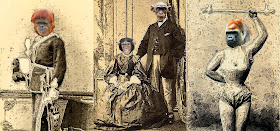Our Paper Traders yahoo group recently hosted a
restructured paper swap based
on an article from Cloth Paper Scissors Magazine
by Frankie Fioretti and Susan Pickering Rothamel
and then reviewed at the old Gingersnaps blog.
As our members started experimenting with the various ways of creating this paper,
we thought we would put together a step by step and share our tips,
successes and what to stay away from.
As we found out, the base that you start on is very important. The Gingersnaps blog
recommended a non-sticky craft mat. Some craft sites said that a kitchen cutting mat
would work as well but our member Beckie H. stated that when she tried this, her paper
stuck to the mat and would not peel off. The next time she used her silicone craft mat
and it worked perfectly. I used Reynolds Freezer Paper as my base and it
worked very well, the restructured paper peeled off without a hitch.
Other members just clued their scraps to white copy paper and so did not have to
worry about peeling anything off and had good results with this as well.
Types of glue to use: I used a 1 to 1 mixture of Alene’s Tacky Glue and water.
Other recommended glue was Perfect Paper Adhesive , a mixture of Mod Podge and gel
medium or Golden Glazing Medium/matte.
.JPG)
Supplies: Tacky glue, Scrap paper, freezer paper
For my first step, I glued down six sheets of vintage paper to make
a paper size of about 12”x12”. You could have your first base layer
be anything you want but I wanted some of the text to show through
as I was going to be using some tissue napkin scraps in my design.

Start arranging your scraps of paper from your
“I can’t throw it away” stash and play around with some designs.
Tip: When you are happy with your arrangement, take a picture of it with
your cell phone or digital camera. Once I started lifting and gluing pieces,
I sometimes forgot where I wanted certain pieces to go.
Apply your glue with a brush to the backsides of your scraps
and start layering. I used a heat gun to speed the drying process up.
I’ve basically finished my restructured paper here and only needed
to go back and add some little embellishments to flesh it out.

In this photo, I’ve gone back and added some paper flowers, hole punches
and a little bit more scraps.

Some close-ups of the restructured paper.

After your paper has dried you can peel it off the freezer paper
or craft mat if that is what you are using,
and use it in a variety of ways.
Tip: You can iron your paper if is a little bumpy and
curling up. I glued a piece of mine to a manila tag and stuck it under
a weighted book and it took care of the curling problem.
Tip: If you used slick paper scraps (magazine) in your design, you
will need to coat your restructured paper with a coat of clear gesso
if you will be doing any stamping on it.
The tag I created with a section of my restructured paper. I layered
a piece of white tissue paper onto my tag to soften and mute the colors
with some gel medium.

I applied some silver pigment ink around the edges and
across the top to bring out some definition.

Finished tag:
A card using a section of the paper:
I hope you will give this fun technique a try. I think you will
really enjoy the process and be happy with your results.
Leave us a comment with a link if you'd like to share
your restructured paper adventures.
Cathy C.
Paper Traders


































